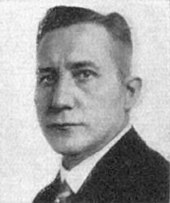Franz Bielefeld (politician, 1880)
Franz Bielefeld (born April 11, 1880 in Gelsenkirchen , † August 8, 1949 in Münster ) was a German master mason , building contractor and politician ( center ).
Life and political activity
Bielefeld was the son of a Gelsenkirchen construction company. After attending the secondary school in Gelsenkirchen, he, who was Roman Catholic, was trained as a bricklayer in his parents' company. After having passed the journeyman's examination, he studied at the Herzogliche Baugewerkschule Holzminden until the spring of 1899 , which he left after passing the final exam. After that, Bielefeld worked in his profession for several years. In 1907 he founded his own construction business in Recklinghausen . In 1908 he passed the master craftsman examination. From August 1914 to November 1918 Bielefeld took part in the First World War, from which he returned as an officer .
Bielefeld began to be politically active in the Catholic Center Party in 1897. From 1912 he was a board member of the party in Recklinghausen and its chairman from 1923 to 1933. In 1924 he was first elected to political office when he was appointed city council was elected by Recklinghausen. In addition, there were numerous economic and social offices at the local and regional level: He became head master of the building trade guild and chairman of the guild committee of the city of Recklinghausen. In 1924 he became a member of the Münster Chamber of Crafts . In November 1927, the General Assembly of the Chamber of Crafts gave him the chairmanship, which he held until 1933. Since the end of the First World War he was a member of the executive board of the House and Landowners Association of Recklinghausen and of the House and Landowners Association for the Rhenish-Westphalian coal field . In addition, Bielefeld was a member of the executive committee of the Rhenish-Westphalian building trade association in Essen and of the Reich Association of German Building Guilds in Berlin .
From 1928 to the summer of 1933, Bielefeld was a member of the Berlin Reichstag for constituency 17 (North Westphalia) . In March 1933, together with the other members of the center parliamentary group, he voted for the Enabling Act , which, with the amalgamation of legislative and executive powers in the hands of the government, formed the basis for the establishment of the National Socialist dictatorship . Then he withdrew from the public.
After the Second World War , Bielefeld participated in the re-establishment of the Center Party in Recklinghausen and was re-elected as its chairman. From 1946 he was again a member of the Recklinghausen city council. From 1946 to 1947 he was a member of the two appointed state parliaments and then, until his death, the first regularly elected state parliament of North Rhine-Westphalia . In the appointed state parliament he was deputy chairman of the reconstruction committee. Furthermore, Bielefeld was a board member of the united chambers of crafts in the British zone .
literature
- The President of the State Parliament of North Rhine-Westphalia (Hrsg.): 60 years of the State Parliament of North Rhine-Westphalia. The country and its deputies. (= Writings of the State Parliament of North Rhine-Westphalia , Volume 17.) Düsseldorf 2006, p. 181.
Web links
- Literature by and about Franz Bielefeld in the catalog of the German National Library
- Franz Bielefeld in the database of members of the Reichstag
- Franz Bielefeld at the state parliament of North Rhine-Westphalia
| personal data | |
|---|---|
| SURNAME | Bielefeld, Franz |
| BRIEF DESCRIPTION | German master mason, building contractor and politician (center), MdR, MdL |
| DATE OF BIRTH | April 11, 1880 |
| PLACE OF BIRTH | Gelsenkirchen |
| DATE OF DEATH | August 8, 1949 |
| Place of death | Muenster |
